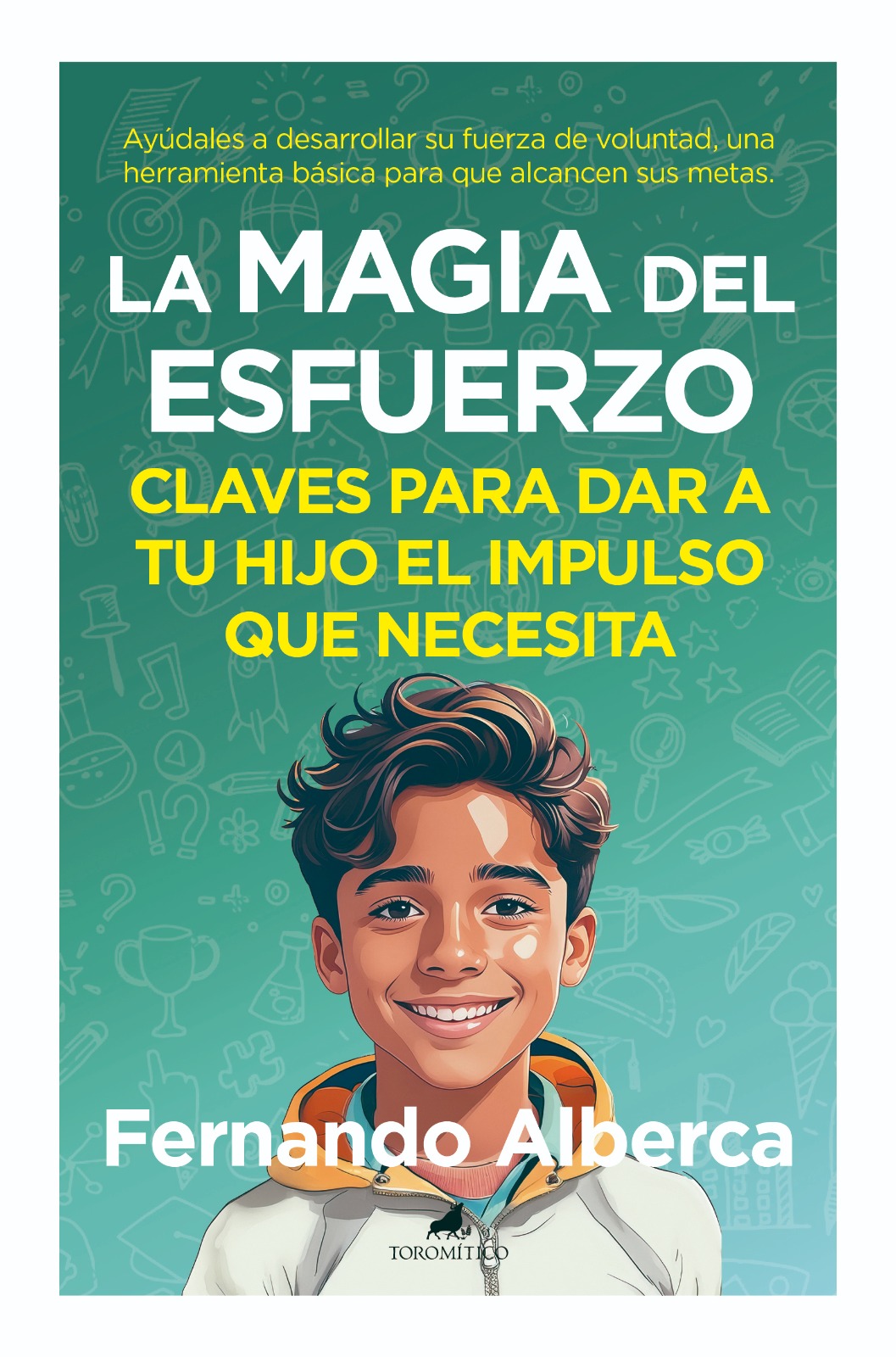The subtitle of the book by Fernando Alberca (Córdoba, 1966), is 'Keys to give your child the impulse he needs'. Every child moves better and much more when he or she does something difficult, with which he or she can look good and feel satisfaction. The real challenge, Fernando Alberca points out, lies in how to find the strength to start, and to persist.
The help that parents and educators can provide is key to pushing them and teaching them how to seek and find their own willpower. Willpower is one of the most valuable gifts you can give your children, she says. But you need to "train willpower," she encourages in this interview and in the book, published by Almuzara.
The expert is the director of the educational consultancy Fernando Alberca, which specializes in educational counseling and school performance and talent, as well as personal and family relationships. He is married and feels that his wife and eight children are "a divine gift".
In the conversation with Omnes, Alberca also discusses issues for the reflection. His request to the Three Wise Men for 2025 is "to treat us better. As if we were all important. That is, more freedom of expression and tolerance for those who are different, more serenity and less conflict". You can see it in full at the end of the interview.
Are you still fed up with poverty and lies, as you said a few years ago in La Vanguardia?
- Much more every day, it must be a problem of my age, that I have more years, more experience or that liars and poor people are increasing.
You have just said that today's adolescents and young people lack the will to start something, continue it and finish it, in statements to El País. Can you explain this briefly? Are they a generation of glass, of iron, or how do you situate it?
- They are made of iron, as shown in their solidarity in the face of catastrophes such as the DANA in Spain, but they need to learn how to support that iron bar that they are in a suitable fulcrum to move their world. It has only happened to them that they have not learned from the previous generation to exert themselves with pleasure and satisfaction, but rather to evade their obstacles, which is why they seem to have no strength, because they have not learned to muscle it: except when they feel a shock of emotion and then their muscles tense up: as always happens with human emotions.
You vindicate effort in your book on 'The magic of effort', and the satisfaction it provides. What is your message?
- The effort is what frees the human being and makes possible what he wants and seemed impossible before the effort. It is what makes you the protagonist of your own life, to live more satisfactorily, because the more effort, the more satisfaction. It makes possible a happy life, impossible without enjoying the effort. The key is to rectify the goal of a comfortable life, without facing obstacles and unhappy, for a happy life, despite the obstacles that can be learned to overcome with effort.
But it is necessary, and the book provides how to do it, not only to discover a radically new concept of effort, but to train the willpower, weakened, and therefore proposes 15 training exercises at home to habituate the ability to follow our will and 17 operations to any particular effort.
What advice would you give to fathers, mothers, educators, to help their children acquire the habit of willpower?
- Do not solve domestic problems, easy to solve, that can be done by your children. Read those 15 domestic training exercises and propose them to your children at least once in a while. And, above all, ensure the satisfaction of your children when they make an effort. Without depending on subsequent external results, which depend on someone else and may or may not come, and are not necessary, if we change the concept of effort: a necessity especially for fathers and mothers (the first part of the book I dedicate to parents who liberate their children and make them able to live and live happily).
The magic of effort.

There are three recent books of his that are very thought-provoking. 'Educating without stress', 'The boy who beat witches and dragons', and 'Geniuses'. A flash of each.
- Taking stress out of our lives as parents and our children's lives is a necessity that prevents very serious mental illnesses and disorders, and it can be done with education.
El niño que venció a brujas y dragones explains how to overcome with positive results the 24 most frequent adversities in children and adolescents, from night fears, apathy or lack of enthusiasm and motivation, loneliness or not having the friends you would like, and 21 more, with real cases solved.
Y Geniales explains why children's genius must be preserved, especially after the age of 11, because when they are young all children are geniuses and when they grow up many of them stop being so. It proposes how parents and teachers can do it and argues how most adult problems would be solved if we acted as children and teenagers act when faced with these same types of problems and the book gives examples of each one, solved by teenagers and children: emotional, creative or philosophical problems, among others.
In schools, can you point to any progress in education in Spain? It seems that vocational training and the percentage of access to higher education are growing, according to the OECD.
- That is so, but we are achieving the most difficult thing: to make access to education possible for all, and we have failed to ensure that education is true education. That is to say, human, that generates meaningful and real learning, and that teaches how to live better and be happier.
In today's schools, school failure and unhappiness of families, students, teachers and even authorities are increasing, simply because the intelligent human being does not adapt to a system so deteriorated and focused on unhappiness. Education is finally becoming more complete: not only analytical, but also emotional. It is also moving forward, becoming more flexible to attend more to the real diversity, that of each individual.
Well: I like the law in it, what is written, not what is taken to the classroom. Because these magnificent advances will be of no use if teachers are not trained in a different, more complete way, to be effectively more human, emotionally and intellectually, and really better, personalized and integrally serve each and every one at every stage of his or her life.
However, the same report also pointed to the problem of early school dropout and poor reading comprehension.
- No one can well imagine, other than teachers, the deterioration of students' reading comprehension skills, which have been created by two means: bilingualism in thinking subjects such as social and natural sciences and an adequate reading learning method (starting with the alphabet and syllables ensures readers who do not learn to read as well as they need to in the future, this was already advocated in the 60's).
No one seems to realize the massive increase in dyslexia caused by digital culture and the aftermath of covid. Two facts that in reading and writing require outstanding changes in schools from kindergarten onwards, but also in universities.
A colleague of his points out that "repetition" (of course) immediately evokes "potential emotional damage in the repeater"What do you think? I am talking about Gregorio Luri.
- My friend Gregorio Luri is usually right, and he is right this time too. Honestly, I have been confirming for 30 years that I cannot find any pedagogical reason that justifies repeating a grade. None. I even challenge my teacher training students to find it in exchange for an "A", but even with that we do not succeed. It is an anachronistic trap. With the current law it is even more absurd, less educational, more harmful.
We change the rules of the game in the middle of the game: we tell them that we gather schoolchildren by age (6 year olds go to Primary 1 regardless of their intellectual capacity, maturity or stimulation, only by the year of birth), however, in the middle of the game it no longer matters the age and that they lose those of the same age (with all that this entails), because they say that what matters is that they have not acquired some objectives that, on the other hand, if they can acquire them by repeating, is that they can acquire them the following year as well: everything is a question of a school adaptation if it is necessary, as the law contemplates and the teachers on foot know.
Almost lastly, what do you think about the treatment of subsidized and private education? Does the Administration finance free education in subsidized education? Sometimes it seems as if it were unconstitutional for them to decide freely.
- I have my doubts as to whether it is a political question, an ideological question or both, but it is not for me to judge. If I know anything, it is only pedagogy and education, and in Spain and other countries the financing of private and charter schools does not seem to be a pedagogical issue. The teachers of private, charter and public schools have been trained in the same faculties and the taxes of the same parents of students finance the public school and the budget that the educational authorities have to do their necessary work.
I take it for granted that the more freedom, the better each child will be able to adapt to his or her convenient model. I have been the director of two charter schools, among others, and the administration of those two communities (Aragon and Asturias in my case), even with good intentions, never financed enough so that families did not have to make a greater effort, added to their taxes, although both communities benefited from the results (not having to support the cost of education of thousands of schoolchildren and through the social and talent results of a larger population, not only the one that fits in the public school).
I wish it were possible for each family to send each of their children or adolescents to school wherever they consider best for their family, depending on how each of them and their environment are. After all, they are the ones who know them best.
What would you ask the Three Wise Men for in 2025?
- Treat us better. As if we were all important. That is to say, more freedom of expression and tolerance for those who are different, more serenity and less conflict, more personal treatment among all, more understanding and empathy: more humanity and inviolable principles of respect for others.








